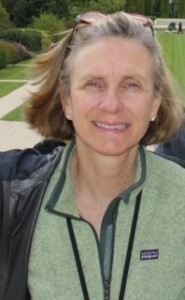Medically reviewed by Ursula Matulonis, MD
By Maura Perkins
I can’t pinpoint when I started to get ovarian cancer symptoms. It was all very subtle and gradual. I was a healthy person. I ran, biked swam, hiked, and went to the gym regularly.
A slight pain in my left side, difficulty digesting food, feeling of fullness, and shortness of breath: those were the subtle constellation of symptoms that landed me in my primary care doctor’s office. At the age of 50, I felt like I was going downhill fast.

There was no history of ovarian or breast cancer in my immediate family. However, I had been concerned about my risk of developing cancer due to exposure to fertility drugs. My gynecologist had agreed to some basic monitoring by vaginal ultrasound every six months. An ovarian cyst was discovered and followed, but I was told it was benign.
The diagnosis
The official diagnosis – stage IV ovarian cancer – came on Mother’s Day, five years ago. Within three days I had major abdominal surgery. I awoke to a reconstructed bowel and many missing body parts, among them a 12-centimeter tumor. My mother moved in to help take care of the kids. I was given four weeks to recover before starting chemo. We were in shock.
I was always determined to recover and get on with my life because it didn’t look like it was going to be a long one. My children were ages 9 and 11, and I wanted to leave a lasting impression.
By an odd twist of fate I was allergic to one of my treatments and was referred to Ursula Matulonis, MD, and Judy Garber, MD, MPH, at Dana-Farber/Brigham and Women’s Cancer Center. With this team of doctors, who are part of the Institute’s Susan F. Smith Center for Women’s Cancers, I was able to safely get the standard treatment for my cancer every three weeks in spite of being allergic to one of the chemotherapy drugs. Over the next three years I had more surgeries, chemotherapy, and radiation. But nothing would work, and the cancer kept coming back. Each time I started a treatment cycle I felt like I was entering a tunnel.
The next step
In November 2011, as my cancer was starting to recur again, Dr. Matulonis told me about a clinical trial at Dana-Farber, offered at only a few places in the world. Thankful that it was an oral medication and wasn’t chemo, I enrolled. While working through the initial side effects with Dr. Matulonis and her team, we were all greatly relieved to see almost immediate and dramatic results on the scans. Not to mention, I was feeling pretty healthy.
The drugs continue to be effective. Every two months I have MRIs to monitor the progress of the disease, which is almost nonexistent on the images today. I have had what is considered to be a complete response to the treatment protocol. I am experiencing a great quality of life. I’ve travelled extensively with my family, completed the 50-mile Pan-Mass Challenge twice, and am active in my community. I feel like I have more energy, ability to focus, and to take on more things that I enjoy. Most people would not know that I currently live with cancer.
But how long will it last? As Dr. Matulonis likes to say, “Maura, you’re sailing in uncharted waters.” It is uncertain how long my current treatment will be successful, because no one really knows how long this combination of drugs will remain 100 percent effective. For now, I am grateful for my health and am getting used to the idea that I might actually live a normal life.

Inspiring Maura.
I have my fingers and toes crossed for you and hope that you have great times while surviving cancer. I too have/had cancer. Mine was in the right parotid gland- SSC, so as a fellow struggler, i wish you the best of the best.
glenn (59)
Inspiring Maura.I have my fingers and toes crossed for you and hope that you have great times while surviving cancer. I too have/had cancer. Mine was in the right parotid gland- SSC, so as a fellow struggler, i wish you the best of the best.glenn (59)
When is this test experiment planned to end and when could this drug become a standardised treatment so other in need could have access to it? Is there any such experiment occuring in Quebec or Montreal Canada?
Maura, like you, i was diagnosed with Stage IV ovarian cancer in 2003. Had surgery, chemo and then 8 years 4 months before my first recurrence in March 2012. I, too, am being treated now at Dana Farber by Dr. Joyce Liu in a clinical trial. I having good results and feeling great. It is truly a remarkable place and we are lucky to live where this treatment is available and close to home. Best of luck to you in your journey. I hope it is a long one!
Mary Parsons
I also have ovarian CA and get my treatment at Dana Farber. Having had 4 recurrences in 5 years I would love to know the name of the clinical trial.
Thanks for sharing your story !
God bless you!!! May you remain in remission and live to a ripe old age.
What a wonderful, inspiring story. Best of luck to you!
Why wasn’t the name of the drug that worked mentioned? Which clinical trial was it that worked?
Great post my friend.Yes, we are sailing in uncharted waters for sure. be well….Jan
Great post. Can’t wait to read more 🙂